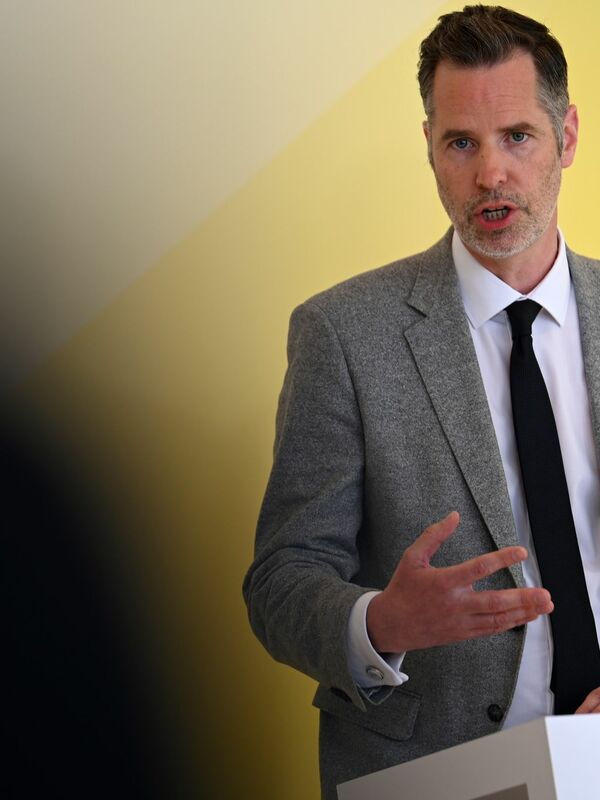Macron wins the pension dispute – the anger of the French does not subside
The French president’s controversial pension reform could largely go into effect. This was decided by the Constitutional Council, despite the protests that swept the country.
For months, pension reform has been driving the French: Protesters in Strasbourg.
Photo: AFP
It has been a long time since so much attention has been focused on the French Constitutional Council. Garbage bins were already piling up in front of the Paris court near the Louvre on Thursday — and opponents of pension reform had blocked the entrance with them. A few hours later, the French Minister of the Interior issued a ban on gatherings in the vicinity of the building. Meter-high security fences protected the court on the day of the decision.
According to French newspapers and news channels, the entire country was looking into the court that decided to reform the controversial pension system on Friday. Is this the beginning of the end of the controversy that has occupied the country for three months?
Individual articles in the law are not constitutional
The nine constitutional council judges have now largely approved the controversial reform. This means that the law could go into effect as planned before the end of this year. According to the decision, raising the legal retirement age from 62 to 64 in the future is a constitutional matter. However, the justices have also declared some articles of the law unconstitutional, including a seniority index that must require companies to disclose the percentage of employees who are older.
Since January, France has been arguing about the reform that President Emmanuel Macron and his government are planning. Among other things, it envisages gradually raising the statutory retirement age from 62 to 64 by 2030. In mid-March, the government undertook the reform under a constitutional provision It passed without a vote in Parliament, so officially goodbye. The reform aims to prevent an imminent hole in the pension fund. The full pension payment period should be increased more quickly.
Macron and his prime minister have said repeatedly in recent weeks that reform, with the decision of the Constitutional Council, “has reached the end of the democratic path.” They rejected criticism of their decision to impose the law without a vote in parliament, saying the measure was in line with the French constitution and therefore legitimate. According to polls, more than two-thirds of French people reject pension reform. For Macron, reform is a central theme of his second term.

President Emmanuel Macron hopes the protests will subside.
Photo: AFP
Emmanuel Macron said this week that he proposes that the social partners exchange ideas again after the decision of the Constitutional Council. The offer was not well received by everyone. CGT’s new boss, Sophie Binet, was amused. She explained that her union would only attend the meeting when it was about to complete the reform. “We will continue to support protests and strikes,” said Mathilde Bannot, head of the parliamentary group of the left-wing La France Insoumise party, on Friday evening.
The government hopes the protests will subside. On Thursday unions called for the twelfth day of strikes. At demos across the country, fewer and fewer people have taken to the streets lately. At the beginning of March there were more than a million, and this week there were about 400,000. The court’s decision may fuel protests again. “This is not the last day we’ll be on the move,” CGT President Binet said this week. On Friday evening, she said: “We call on the government not to activate this law.”
The Constitutional Council also canceled the proposal to hold a referendum on pension reform, which had been put forward by the opposition.
To date, many different French The unions seemed surprisingly united. The question now is whether the unity will remain in place after the decision of the Constitutional Council. In the government camp, one hopes that Laurent Berger, head of the largest moderate CFDT trade union, will give in. He said the court’s decision must be respected. As he said on the sidelines of a protest rally this week: “We’re not going for anything else.”
Prime Minister: “There is neither a victor nor a vanquished”
The Constitutional Council also canceled the proposal to hold a referendum on pension reform, which had been put forward by the opposition. The decision on another application should be made in the coming weeks. However, even if the court grants the request, it is unlikely that a referendum will actually take place. This would require the support of nearly five million French. In addition, the government can prevent the referendum from taking place by discussing the proposal in Parliament.
Despite the success, Macron is not the clear winner. The president and his central government are Riddled with the hard struggle for reform. Prime Minister Elizabeth Borne wrote cautiously: “Tonight there will be neither winners nor losers.”
Call for a national strike on Labor Day
The president, almost sacrificing himself, declared that reform was in the best interests of the country and that he was willing to accept unpopularity. However, he now hopes to quickly put the troublesome pension issue behind him. He is expected to address audiences next week, and then, with a series of trips around the country, he intends to do what he avoided in the fight for reform: show presence. Macron has remained in the background in the pension dispute. Trade unions and large parts of the opposition reject reform.
On the occasion of Labor Day on May 1, the unions again called for a nationwide strike. And less than an hour and a half after the decision of the Constitutional Council, a bicycle rental platform in Paris has already caught fire.
Found an error?Report now.

“Typical entrepreneur. Lifelong beer expert. Hipster-friendly internet buff. Analyst. Social media enthusiast.”





More Stories
Pedro Sanchez is considering resigning after filing a complaint against his wife
Extreme heat warning in Thailand and the Philippines
Argentine President Miley announces a budget surplus – News